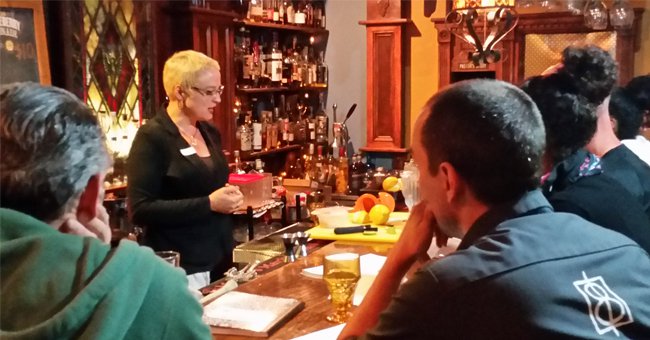When Erik Holzherr opened his first cocktail-focused bar in Washington D.C., the name had to convey several things: that the bar would be neither pretentious nor intimidating, that patrons could score a well-balanced Manhattan and ask questions about any aspect of the concoction, and most importantly, that bartenders who worked there would be excited to share what they knew about all the liquors at their disposal.
The answer: Wisdom.
Over the past seven years Holzherr has taken the job of educating customers about spirits seriously, especially within the confines of that Capitol Hill bar. He started a Wisdom gin club and regularly hosts tastings and classes for the growing cadre of cocktail enthusiasts.
Now, he’s taking his passion for alcohol education one step further. Holzherr is opening a full-fledged school for bartenders and really anyone whose livelihood revolves around spirits — think continuing education for the not-going-anywhere mixology craze.
Thus far, BAR WISDOM is offered only in the D.C. area, but the concept could have legs as drinkers become more inquisitive and bartenders need to be more knowledgeable. “Consumers are way more educated than ever before about what they’re drinking,” says Holzherr. “They now have a certain expectation at a bar. They want specialties, and they want the bartender to really know what they’re talking about.”
Yet there aren’t many places for professionals behind the bar to gain this deep level of understanding. Cocktail books offer up others’ recipes, giving little foundation for creativity. And Holzherr says he’s hired far too many people out of traditional bartending schools who were ill-prepared for the realities of working in the industry.
In response, he seeks to offer a perfect blend of history, science and fundamentals for working in a high-end bar. This level of expertise is particularly worthwhile as bartenders stay in the drink-making game for longer, striving to create a career rather than just temporarily put away cash.
“Understanding how the spirits are made, what makes them different gives a really strong background to get to the creative side,” he says. “You need those fundamentals; you can’t just start mixing things together and guessing that peaches taste good with cream. There’s more to it than that.”
The “textbook” that provides the curriculum for BAR WISDOM has been in the making for four years. Holzherr gradually put to paper lessons from his bar experience as well as from interviewing distillers and distributors about their takes. What results is five distinct chapters that go from proper glassware, to how beer and wine are made, to the subtle differences between Russian and Polish vodka.
“The idea isn’t to turn someone into a sommelier or get them to build a still in their house but to give them a solid, thorough background of these liquors so they can know a lot about many different aspects,” he explains.
The BAR WISDOM students don’t just idly read and listen; during class sessions — held at either Wisdom or Church & State, another one of Holzherr’s bars — they’ll taste different spirit styles, give their takes on flavor combinations and ultimately pass a final exam to earn something resembling a diploma. There’s even time devoted to pouring drills and drink-creating alongside seasoned veterans.
So far the students range from a brand new bar manager to someone who’s tending bar a night or two a week but wants to transition to being a full-timer, adept at recommending new alcohols for customers to try and capable of making any drink that’s ordered.
During a recent class focused on gin, instructor Tania Morgan talked through the liquor’s evolution from revered medicine to a scapegoat nicknamed “mother’s ruin.” Then everyone sipped samples of Beefeater, one of the prototypical London dry varieties, and CapRock, a gin made in Colorado with hints of lavender. Boasting less of an extreme juniper berry flavor, she tells them that CapRock is more drinkable for gin newbies and helps her do one of her favorite things as a mixologist, persuade imbibers to try a spirit out of their comfort zone.
It’s a message Morgan comes back to often during the class — and is a big part of why Holzherr launched this cocktail school.
“With drinks, people will stay with one for years and years and not know why. Nobody ever does this with other things like food. No one says, ‘I only eat fish sticks, that’s it.’ Or if they do, we look at them strangely,” she jokes. “I like being the person who will get them to like a new spirit and the challenge that comes with that.”





